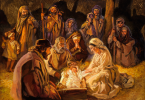Theme: How do I rate myself when it comes to Jesus’ mission command.
Scripture reading: Acts 22:3-16; Ps. 116:1-2; Mk. 16:15-18
The Church celebrates the feast of the conversion of St. Paul today. There is yet another feast of the martyrdom of St. Paul celebrated along with St. Peter on June 29. The Church honours Sts. Peter and Paul by asking us to recognise them in our journey of faith. We find many reference to the conversion of St. Paul are written in the Acts of the Apostles at least at three different places. St. Paul also gives the reference to his conversion in his epistles. What should the reason that there are so many times his story of conversion is highlighted? Why do the church honour his conversion by setting aside a separate in the calendar on Jan 25?
A meditation on the passages of Jesus’ mission command in the Gospels (Mt 28:16-20; Mk. 16:14-18; Lk 24:44ff, Jn 20:19ff) and the Acts of the Apostles (2:1:4-8) with the scripture passage on the conversion of Paul gives us insights that Jesus fulfilled his promise which He had made before ascending into heaven. And Paul shows how must one follower keep the command of Jesus in his/her life. The conversion of Paul was his new birth in Jesus. He was batised and found new sight to lead his journey of faith.
Let us look at couple of important points in the mission command of Jesus. When we collectively look at them, they give us complete picture what it really meant to be. Jesus says, firstly, go into all the world and proclaim the good news (repentance in Luke) to the whole creation. Secondly, those who believe and is baptised will be saved. Thirdly (Mark), those who does not believe will be condemned. Fourthly (Mark), those who believe will witness these signs. Fifthly (Mathew), teach everything that I commanded you and sixthly (Mathew), I will be with you till the end of the age. Lastly (Luke and Acts), be my witnesses.
On the one hand, Jesus shows in the life of Saul that He was with the persecuted. Therefore, he told him, “why do you persecute me?”. Jesus never questioned him by saying “why do you persecute them?”. Jesus revealed the followers his promise of being with them till the end of the age even in their persecution. On the other hand, St. Paul becomes the supreme example of fulfilling all the commands of Jesus. Paul considered himself the apostle of gentiles. He preached Christ to them. He persecuted early Christians but when he believed in Jesus and he was baptised by Ananias. He performed many signs in the name of Jesus which are recorded in the Acts. To name a few, he cured the lame (14:10), he performed exorcism on a lady (16:18), his apron and handkerchiefs made the diseases well (19:11ff), raised a boy to life (20:10ff), survived from the poisonous bite (28:5), healed the father of Publius (28:8). At the same time, Paul taught with the authority given by the Lord. Thus, Paul became the powerful witness of Christ.
It is important to note that Paul was not part of Jesus’ ministry. He had not seen him with his eyes. He is not found anywhere in the Gospel. We can associate ourselves with Paul for we too have not seen earthly Jesus. But in order to claim the blessedness which Jesus gives us in the Gospel of John, “Blessed are those who have not seen and yet have come to believe (John 20:29), we need to have conversion of heart. We need to believe in Christ.
At every Eucharistic celebration Jesus makes encounter with us. He comes to talks to us. He calls us by name. Do we listen to his voice? Are we seeking Christ in our moments of blindness? Where do I rate myself when it comes to the command of Jesus. St. Paul did the best even though he came from behind. Let us discern the mission of Christ which he has entrusted to each one of us that Christ is proclaimed to the whole creation.
Fr. Alex D’Mello






